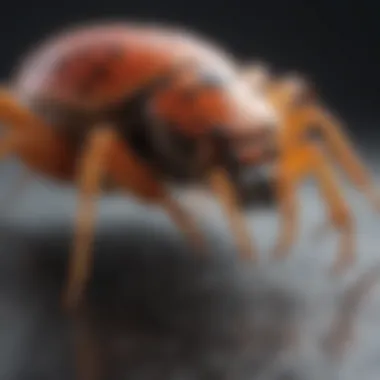Top Outdoor Bug Sprays for Spider Control


Intro
Spiders are often misunderstood creatures, integral to outdoor ecosystems. They play significant roles in controlling insect populations. However, when they invade our outdoor spaces, it can create discomfort for many homeowners. This article offers a detailed examination of the best outdoor bug sprays for spiders. With a focus on both chemical and naturale solutions, we will navigate the complexities of selecting effective insecticides. Understanding how to manage spider populations not only improves comfort but also promotes a balanced environment.
Understanding Pests
Definition of Pests
Pests are organisms that cause harm to human interests, including plants, animals, and structures. In this context, spiders are often seen as pests because of their presence around homes and gardens. They can damage crops and plants and cause inconvenience to families and guests. Identifying the type of spider present is critical in determining the most effective management course.
Importance of Pest Identification
Identifying the specific spider species is essential. Not all spiders are harmful. Many are beneficial as they reduce the number of harmful insects. By understanding what you are dealing with, you can make better decisions on pest control methods.
Prevention Techniques
Home and Garden Preventative Measures
Taking the initiative to prevent spider infestations proves more effective than reacting to them. Here are few tips:
- Keep gardens and yards trimmed and clear of debris.
- Seal cracks in walls and around windows to minimize entry points.
- Use mulch sparingly, as it can harbor pests.
Seasonal Prevention Tips
Certain seasons may warrant increased spider activity. In fall, for instance, many spiders seek shelter indoors as the weather cools. Homeowners can take the following precautions.
- Close windows and doors securely.
- Check outdoor furniture and shake it off before use.
- Install weather stripping around doors to close gaps.
Eco-Friendly Pest Control Solutions
Overview of Sustainable Practices
Using eco-friendly pest control solutions reduces environmental impact. Many chemical sprays can harm beneficial insects too. Sustainable practices involve using integrated pest management techniques, which focus on long-term prevention strategies.
Natural Remedies and Their Effectiveness
Natural remedies are increasingly popular. Here are some effective options:
- Diatomaceous Earth: Sprinkling this powder in areas frequented by spiders can result in dehydration.
- Essential Oils: Certain oils, like peppermint and tea tree, can repel spiders when diluted with water and sprayed around their habitats.
"Understanding the balance in your outdoor environment is key to spider management. Not all spiders require elimination."
This article provides insights into the vast array of pest control products available. It is pertinent to choose wisely, considering the active ingredients and potential impact on the environment.
Foreword to Spider Management
Managing spider populations in outdoor spaces is an essential aspect of pest control for homeowners. Spiders, while beneficial for their role in the ecosystem, can become a nuisance, especially when their presence escalates. Understanding the complexities of spider behavior and their habitats can empower individuals to take effective measures. This section serves as an introduction to spider management, highlighting key strategies and considerations that are vital for maintaining a control over these creatures.
Understanding the Spider Problem
Spiders are often misunderstood; they play a significant role in controlling other pest populations. However, when they invade areas close to human habitats, they can trigger fear and discomfort. Many homeowners fail to recognize that spiders typically seek shelter and food in outdoor environments where they can thrive. Factors such as an abundance of insects or undisturbed spaces can attract them. This creates the need for a proactive approach to spider management.
Several species of spiders may be common in residential areas. Among them are the common house spider, black widow, and brown recluse. Each species has unique traits and potential risks. For instance, while most spiders are harmless, some do possess venom that can pose health risks. Therefore, identifying spider species is a fundamental first step in managing their populations effectively.
Regular inspections of outdoor areas, particularly corners, basements, and gardens, can help in spotting spider webs and nests. Taking a moment to understand spider habits can greatly assist in preventing infestations and ensuring a healthier living environment. For every homeowner, awareness and knowledge are key components in tackling the spider problem head-on.
The Role of Bug Sprays in Pest Control
Bug sprays are a primary line of defense in spider management. These products offer solutions for immediate control of spider populations while also contributing to long-term management strategies. Not all bug sprays are created equal; they vary widely in formulation and effectiveness against specific pests.


Chemical insecticides have traditionally been the go-to option for many users due to their potency. These sprays work by disrupting the nervous systems of pests, leading to their elimination. However, concerns regarding safety and environmental impact have led to a rise in natural alternatives. These products often use essential oils and plant-based ingredients to repel spiders with a focus on less toxicity to humans and pets.
In addition to their immediate effects, bug sprays can also help in creating a barrier that deters spiders from returning. Regular application can establish a protective zone around homes, significantly reducing the likelihood of spider intrusions. However, it is crucial for users to follow application guidelines carefully to maximize efficacy and minimize unintended consequences.
The right choice of bug spray can make a substantial difference in controlling spider populations effectively.
Types of Outdoor Bug Sprays
Understanding the various types of outdoor bug sprays is crucial in effective spider management. Each category offers different advantages, active ingredients, and methods of application. Choosing the right product can significantly enhance the efficacy of pest control and contribute to a spider-free environment. Below are three main types of outdoor bug sprays that homeowners and housewives should consider: chemical insecticides, natural alternatives, and combination products.
Chemical Insecticides
Chemical insecticides are synthetic compounds designed to deter or kill insects. They often contain powerful active ingredients that can effectively eliminate spiders upon contact or through ingestion. Some widely used chemical compounds include pyrethroids, which come from natural pyrethrins found in chrysanthemum flowers but have been synthesized for stronger effectiveness.
When applying chemical insecticides, it is crucial to follow the manufacturer’s instructions carefully. This ensures you maximize the product's effectiveness while keeping safety in mind. These sprays can cover large areas and often provide long-lasting results, especially against persistent spider populations. Moreover, many chemical insecticides are formulated to target specific pests, reducing the risk of harming beneficial insects.
"Chemical bug sprays often provide rapid results, making them popular for immediate spider issues, but should be used with caution to minimize impact on the environment."
Natural Alternatives
Natural alternatives are becoming increasingly popular due to their lower environmental impact and perceived safety. These products often contain plant-based and organic ingredients, such as essential oils, which have insecticidal properties. Some common essential oils include peppermint, tea tree oil, and clove oil.
Homeowners may find natural insecticides less harsh and more acceptable for use around children and pets. However, the effectiveness of these sprays can be variable. They often require more frequent application due to their shorter residence time on surfaces. Nevertheless, they appeal to those looking to maintain an eco-friendly household while managing spider populations effectively.
Combination Products
Combination products merge the effectiveness of chemical insecticides with the gentler approach of natural alternatives. They include both synthetic and organic ingredients designed to maximize pest control while minimizing ecological impact. For example, a spray might contain both pyrethroids for immediate effect and essential oils for long-term prevention.
These hybrid solutions are appreciated by individuals seeking a balanced approach to pest management. They provide versatility and can be effective against a range of pests, not just spiders. When selecting a combination product, consider the specific brands that have proven track records within your local area. This might help in matching the solution with the spider species prevalent in your outdoor spaces.
Key Ingredients to Look For
When selecting an outdoor bug spray for spiders, identifying the right key ingredients is crucial. These ingredients directly affect the effectiveness, safety, and environmental impact of the spray. Understanding these components can help users choose a product that aligns with their specific needs and values.
Pyrethroids
Pyrethroids are synthetic chemicals formed to mimic the natural insecticide found in chrysanthemum flowers. They are commonly used in many bug sprays due to their effectiveness against a range of insects, including spiders. Pyrethroids work by targeting the nervous system of the insect, leading to paralysis and eventual death.
Some advantages of using pyrethroids include their fast acting nature and residual effects. These sprays tend to remain effective for weeks after application. However, users need to consider that pyrethroids can pose some risks to non-target species, like beneficial insects, fish, and other aquatic organisms. Therefore, following application guidelines and safety recommendations is essential.
Essential Oils
Essential oils are naturally derived substances that can deter spiders when properly formulated. Notable oils include peppermint, tea tree, and lavender. These oils can affect the spiders' ability to navigate and function, often disrupting their natural behaviors. Moreover, they provide a more eco-friendly alternative to chemical insecticides.
Using essential oils in bug sprays offers a scent that many find pleasant. However, essential oil products may need to be reapplied more frequently than chemical counterparts because their effects diminish faster. It is also important to ensure that these products are safe for pets and children, particularly if you choose to use them in a residential setting.
Insect Growth Regulators
Insect growth regulators (IGRs) represent another approach to spider management. Unlike typical insecticides, IGRs do not kill insects outright. Instead, they disrupt the normal development processes of immature insects, preventing them from maturing into reproductive adults. This proactive measure helps to control spider populations more sustainably.
When selecting products containing IGRs, there are varying levels of efficacy based on product formulation and the specific insect life cycles. It’s beneficial to consider an IGR as part of a larger pest management strategy. IGRs can be combined with other types of sprays to ensure comprehensive pest control.
Effective spider management requires an understanding of the key ingredients in bug sprays. Knowing the pros and cons of these components helps in choosing the right product.
In summary, recognizing the importance of key ingredients when selecting outdoor bug sprays can guide better decisions. Pyrethroids, essential oils, and insect growth regulators each have unique benefits and considerations. A well-informed choice ensures that homeowners effectively manage spider populations while being mindful of safety and environmental impact.
Evaluating Product Effectiveness
Evaluating product effectiveness is a crucial step in choosing the right outdoor bug spray for spiders. It goes beyond merely picking a product off the shelf. A well-informed decision can significantly influence the extent of spider control you achieve. When selecting a spray, one must focus on various factors that contribute to its actual performance. Understanding how to assess user feedback and scientific studies can guide homeowners in making informed choices.
In this competitive market, any product’s advertising claims can often be misleading. Therefore, evaluating effectiveness is not just beneficial; it is necessary. It helps in achieving long-term control and satisfaction with your pest management strategy, while also ensuring that the product aligns with your values regarding safety and environmental impact.


User Reviews and Feedback
User reviews and feedback serve as a primary resource for those considering outdoor bug sprays. They provide firsthand accounts from individuals who have already tried the products in question. Look for reviews that detail specific experiences with spider control and overall satisfaction. Key points to consider include:
- Effectiveness: Users often share how well the product worked against spiders.
- Ease of Use: Tips on how simple the application process is can guide new users.
- Timeframe: Some reviews mention how quickly they noticed results after application.
- Safety: Feedback regarding any adverse effects on pets or plants is vital.
Exploring discussions on platforms like Reddit can also yield insights into the products that perform well in real-life situations. Engaging with these communities provides a more holistic understanding of product effectiveness.
Independent Studies
Independent studies add another layer of credibility when evaluating outdoor bug sprays. Research conducted by unbiased third parties assesses the efficacy of various formulations under controlled conditions. It enables you to compare products based on scientific criteria rather than marketing claims. Key elements to look for in these studies include:
- Controlled Testing: Products are often tested against specific species of spiders to determine effectiveness.
- Side Effects: Studies frequently include information about potential negative impacts on non-target organisms and the environment.
- Long-term Results: Some research focuses on how well a product maintains its effectiveness over time.
Citing studies from reputable sources like Britannica can enhance your understanding. The application of scientific knowledge helps solidify confidence in your choice of spider spray and ensures that it meets all necessary safety standards.
Application Techniques
The application techniques used for outdoor bug sprays are crucial to their effectiveness in managing spiders. Understanding how and when to apply these products can make a notable difference in their performance. Proper application not only maximizes the efficacy of the chosen product but also minimizes risks to humans, pets, and the environment. A thoughtful approach to application contributes to long-term control of spider populations, offering a more peaceful outdoor space.
Proper Timing for Application
Timing is a vital element when it comes to applying bug sprays. The best times to apply insecticides often coincide with periods during which spiders are most active. Typically, this is during warmer months when outdoor activities increase, making their presence more noticeable. Early morning or late afternoon are often the most effective times, as temperatures are usually cooler, and the winds are calmer, which helps minimize drift and promotes adequate coverage.
Consideration should also be given to local weather conditions. Applying sprays right before rain can wash away the product, leading to ineffective treatment. Therefore, it is wise to check weather forecasts prior to the application to ensure that rain is not imminent. Additionally, avoid using these sprays during high humidity, as it can cause the product to break down more quickly, diminishing its potency.
"Correct application timing can enhance the effectiveness of your spider management strategy."
Targeting Spider Habitats
Effective spider control hinges not only on the right product but also on targeting the habitats where spiders are likely to reside. Outdoor areas such as gardens, near doorways, vents, and other entry points are prime spots where spiders typically dwell. Applying bug spray in these areas ensures that it directly reaches spiders where they live and reproduce.
When applying sprays, focus on corners, eaves, and the underside of leaves. These spots provide ideal hiding places for spiders and their webs. In gardens, consider treating the base of plants or shrubs, as this is where many spiders tend to congregate.
A systematic approach to application can lead to a notable reduction in spider populations. Keep in mind to follow the manufacturer's instructions closely. The right application method will not only enhance the product's effectiveness but also ensure safety for all inhabitants of the space.
Safety Considerations
Protecting Humans and Pets
The use of bug sprays, particularly those containing chemical insecticides, can pose health risks to humans and pets. It is important to read labels carefully to understand any harmful effects and necessary precautions.
Some general safety tips include:
- Choose low toxicity options: Products labeled as low toxicity can help minimize risks to pets and family members. Options containing natural ingredients, such as essential oils, may be safer alternatives.
- Avoid direct exposure: When applying sprays, ensure that nearby people and pets are at a safe distance. This will help reduce inhalation or skin contact.
- Store products securely: Keep all bug sprays out of reach of children and pets to prevent accidental ingestion.
- Follow application instructions: Adhering to recommended dosages and application methods lowers risks of overexposure.
Evaluating user reviews can also help identify which products are user-friendly and safer for households with pets and children.
Environmental Impact
The environmental considerations of outdoor bug sprays cannot be ignored. Many chemical insecticides can have long-lasting effects on surrounding ecosystems. Here are some aspects to consider:
- Impact on non-target species: Chemical sprays can harm beneficial insects, such as bees and butterflies, which are essential for pollination and ecological balance.
- Water runoff: During rainfall, residues can wash away into nearby water sources, potentially contaminating them. Selecting products that are less harmful to aquatic life is wise.
- Soil health: Continuous use of strong insecticides may affect soil microorganisms, which play a significant role in maintaining soil health and fertility.
"A responsible approach to pest control includes considering the broader implications of the products on the environment and community."
A growing number of environmentally conscious alternatives exist. Natural products derived from plants not only reduce risks but also promote healthier ecosystems. Prioritizing such options ensures effective spider management while safeguarding human and animal health, as well as the surrounding environment.
By weighing the safety concerns relating to humans, pets, and the environment, homeowners can make better choices for effective outdoor spider control.


Maintenance and Long-term Control
Effective spider management in outdoor spaces is not a one-time event. Rather, it requires a continuous effort to prevent and control their populations over time. Maintenance and long-term control of spider infestations involve systematic practices that go beyond the initial application of bug sprays. Understanding this process can greatly enhance the effectiveness of your pest control strategy.
Regular maintenance ensures that any existing pest populations are kept in check while also preventing new populations from establishing. By focusing on maintenance, house owners can create an environment that is less conducive to spider habitation. This involves not only the application of insecticides but also integrating other control measures.
Regular Reapplications
The frequency of reapplication is crucial in managing spider populations effectively. Outdoor environments constantly expose insecticides to environmental factors such as rain, sun, and wind. These factors can reduce the efficacy of bug sprays over time. Hence, regular reapplications must align with the product's specifications and the specific conditions of the outdoor area.
House owners should observe the recommended intervals for reapplication specified by the product's manufacturer. Generally, this can range from every few weeks to monthly, depending on the formulation. Additionally, areas with high spider activity or where other pests are common may require more frequent applications.
- Considerations for Regular Reapplications:
- Weather Conditions: Apply sprays before expected rain.
- Spray Formulation: Some products have longer residual effects than others.
- Local Spider Activity: Areas with high sightings may require tighter schedules.
Monitoring Spider Populations
A critical aspect of long-term control is the active monitoring of spider populations in your outdoor space. This not only provides insight into the effectiveness of your pest control methods but also helps in understanding trends in spider activity. The benefits of monitoring are multifold.
Through consistent observations, house owners can detect spikes in spider populations, prompting early intervention. This may involve adjusting reapplication schedules or trying different products altogether. Further, monitoring can help identify specific spider species present, allowing for more targeted control strategies.
- Guidelines for Monitoring:
- Visual Inspections: Regularly check corners, eaves, and under outdoor furniture.
- Web Checks: Look for new web formations as indicators of spider activity.
- Record Keeping: Maintain a log of sightings and product applications for better analysis.
Keeping a consistent monitoring regimen not only facilitates timely responses to spider activity, but it also empowers homeowners to adapt their strategies based on real data.
Cost Considerations
Understanding the costs involved in pest control, particularly for spider management, is essential for effective decision-making. The right approach can save time and money, ensuring that outdoor spaces remain free from these pests without compromising budget. Cost considerations encompass various elements, including initial investment, recurring expenses, and the overall value delivered by the chosen products.
Budgeting for Pest Control
When budgeting for pest control, especially insect sprays, it is important to assess both immediate and long-term expenses. Many products on the market come with varying price points, often reflecting their formulation or brand reputation.
- Initial Purchase: This includes the cost of the bug spray itself. High-quality insecticides may require a larger upfront investment compared to some cheaper options.
- Application Frequency: Regular applications are necessary for effective control. This means considering how often you will need to repurchase bug sprays. A product with a longer-lasting effect may be more cost-effective over time.
- Equipment and Accessories: In addition to sprays, there may be a need for application tools, such as sprayers or protective gear. These costs should be factored into the budget as well.
After evaluating these components, it is crucial to align the total anticipated spending with your financial capabilities.
Cost vs. Efficacy Analysis
Choosing a bug spray involves examining the relationship between cost and its effectiveness. While it might be tempting to opt for the cheapest option, effectiveness is paramount in spider control. An effective product saves money in the long run by reducing the need for multiple applications or additional pest controls.
- Effective Ingredients: Analyzing which active ingredients demonstrate superior performance is essential. Products like those containing pyrethroids tend to deliver high efficacy at a reasonable cost.
- User Feedback: Reviews from other users often provide insight into a product's performance relative to its price. Consider checking platforms like Reddit or product review sites. This can help assess if the price reflects the value received.
- Long-term Savings: By investing in a more effective product, homeowners might avoid extensive infestations that can lead to higher repair costs in the future.
"Prioritizing efficacy when choosing a bug spray saves money and effort in long-term spider management."
In summary, both budgeting and evaluating the balance between cost and efficacy help make informed decisions in selecting outdoor bug sprays for spiders. It's about creating a strategy that not only addresses immediate needs but also ensures ongoing pest control success without overspending.
Finale
In reviewing the best outdoor bug sprays for spiders, it is crucial to recognize the significance of this topic for homeowners and housewifes seeking effective pest control solutions. Spiders, while beneficial in many ecosystems, can become a nuisance when they invade residential spaces. Reviewing different bug sprays helps individuals make informed decisions about managing spider populations in their outdoor environments. This article has established guidelines and recommendations based on effectiveness, safety, and practicality.
Recap of Recommendations
To effectively address spider issues, selecting the appropriate insecticide is vital. Here are key recommendations from this article:
- Chemical Insecticides: For immediate and strong results, pyrethroid-based sprays like Ortho Home Defense may be effective. They target a broad range of insects and can provide long-lasting protection.
- Natural Alternatives: For a more eco-friendly approach, consider products featuring essential oils such as peppermint or tea tree oil. They not only deter pests but are safer for children and pets.
- Combination Products: Some products like Raid Max offer a blend of chemical and natural ingredients, providing a middle ground for those seeking efficacy while minimizing toxic exposure.
"The choice of bug spray can significantly impact the effectiveness of spider control and overall safety of the household."
Final Thoughts on Spider Management
Managing spider populations around homes requires a strategic approach. Regular maintenance, such as reapplication of bug sprays and monitoring spider habitats, cannot be overstated. As outlined in previous sections, knowledge of the effectiveness of various products and safety measures are essential.
In the context of pest control, understanding the specific needs of spiders can lead to more sustainable practices. Integrate methods such as removing debris and sealing entry points alongside the use of bug sprays for comprehensive prevention.



